DAVAO CITY (MindaNews / 08 February) – Officials on Thursday confirmed an outbreak of African Swine Fever (ASF) in two barangays in Calinan District – Dominga and Lamanan — but they have yet to “backtrace” how the virus got there and while neighboring provinces claim they are still ASF-free, defenses have been set up to stop the spread of the killer disease in Mindanao’s 27 provinces and 33 cities, particularly in the mainland.
Mainland Mindanao has 22 provinces and 32 cities.
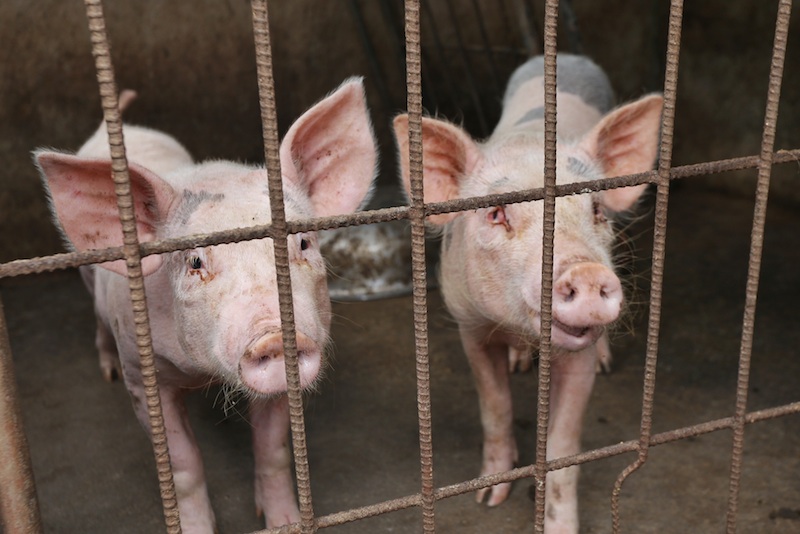 Their days are numbered. These pigs await final clearance before collection for culling due to African Swine Fecer. After Davao Occidental, two of the city’s 182 brangays tested positive for ASF and a lockdown has been imposed. MindaNews photo by MANMAN DEJETO
Their days are numbered. These pigs await final clearance before collection for culling due to African Swine Fecer. After Davao Occidental, two of the city’s 182 brangays tested positive for ASF and a lockdown has been imposed. MindaNews photo by MANMAN DEJETO
The confirmation of ASF here came a week after Mayor Michael Maruya of Don Marcelino in Davao Occidental reported the death of “more or less 1,000” pigs in eight of the town’s 15 barangays on January 31, the first recorded ASF outbreak in Mindanao, barely five months after Agriculture Secretary William Dar confirmed the first ASF outbreak in the country, in Rizal and Bulacan provinces in Luzon.
Barangay Dominga in Davao City is 188 kilometers from Don Marcelino, the ‘Ground Zero’ for ASF in Mindanao.
In neighboring Davao del Sur, Governor Douglas Cagas told MindaNews on Thursday afternoon that his province was “still ASF-free” and that he had met with Davao del Sur’s hog raisers a day earlier and “we agreed to block the entry of all pigs, pork – fresh or processed – coming from Davao Occidental.” The meeting came a day before the confirmation of ASF in two of Davao City’s 182 barangays.
On Friday morning, Cagas said they will also block the same products from Davao City.
Governor Nancy Catamco of North Cotabato, which shares a boundary with Davao del Sur and Bukidnon, told MindaNews on Friday morning that they are “still ASF-free and no reported cases” but they have set up a “task force and quarantine at the port of entry particularly in Tulunan, Makilala, Libungan and Arakan towns.
On Friday, Governor Tyrone Uy of Davao del Oro also ordered quarantine checkpoints set up to prevent the entry of hogs and pork products from Davao Occidental, Davao del Sur and Davao City.
On Monday, Mayor Sara Duterte ordered a ban on the entry of pigs and pork products from Davao Occidental and Davao del Sur.
Lockdown, indemnification
Dr. Cerelyn Pinili, Davao City Veterinarian, said approximately 30 pigs have been reported to have died in barangays Dominga and Lamanan in Calinan district, and two blood samples taken from Dominga both yielded positive for ASF while three of six samples from Lamanan tested positive, prompting them to impose a lockdown in the two barangays and portions of adjacent barangays falling within one-kilometer radius.
The City Council on Friday declared a state of calamity in the two barangays.
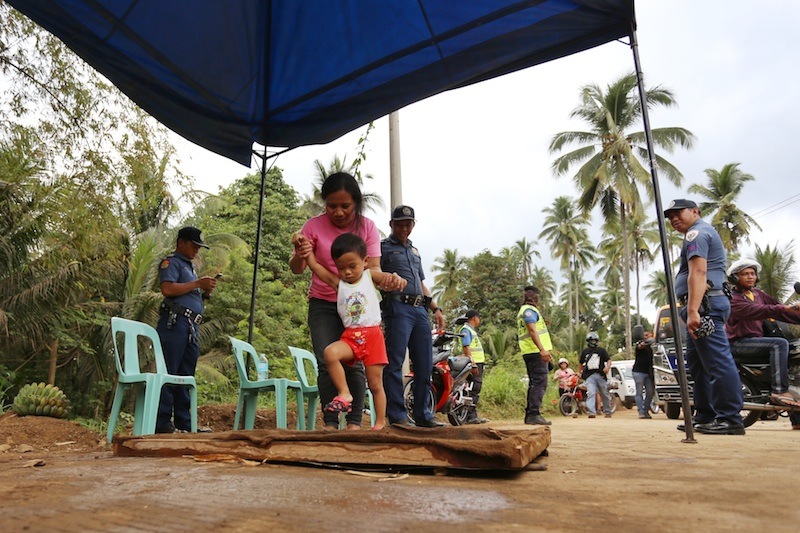 A child is helped in stepping on a foot bath in this quarantine checkpoint in Purok 4, Barangay Lacson in Calinan District, Davao City on 7 Feb 2020 to prevent the spread of African Swine Fever (ASF). Neighboring barangays Lamanan and Dominga are on lockdown due to the ASF but suspected cases of ASF have been reported a few meters away from this checkpoint. MindaNews photo by MANMAN DEJETO
A child is helped in stepping on a foot bath in this quarantine checkpoint in Purok 4, Barangay Lacson in Calinan District, Davao City on 7 Feb 2020 to prevent the spread of African Swine Fever (ASF). Neighboring barangays Lamanan and Dominga are on lockdown due to the ASF but suspected cases of ASF have been reported a few meters away from this checkpoint. MindaNews photo by MANMAN DEJETO
Agriculture Regional Director Ricardo Onate said government will indemnify owners of pigs that will be culled at 5,000 pesos per head “regardless of age except sucklings.”
The city government is giving more than what the DA is offering. At the press conference with Onate on Thursday afternoon, Pinili said the city will pay farmers 5,000 pesos per head of hog regardless of age and weight, plus the number of kilos at live weight multiplied by the prevailing price per kilo.
For example, Pinili said, if a farmer’s pig is 20 kilos live weight, the farmer will get 5,000 pesos per head from the city government, regardless of age and weight plus the price per kilo, in this case 20 kilos multiplied by the prevailing price. This is aside from the 5,000 pesos per head that the national DA will give.
On Friday, however, at an interagency meeting on the ASF, Pinili, according to the City Information Office, clarified that the city will pay 1,500 for piglets and 5,000 pesos per pig or 90 pesos per kilo “whichever is higher.”
CIO chief Jefry Tupas said the farmers will be paid “before culling.”
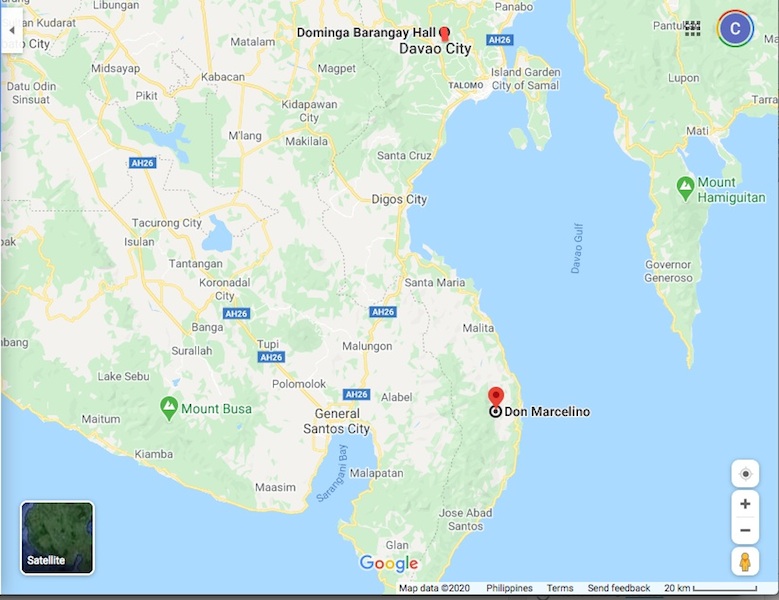 Don Marcelino town in Davao Occidental, ‘Ground Zero’ for African Swine Fever in Mindanao, is 188 kilometers away from Barangay Dominga in Davao City. Barangays Dominga and Lamanan in Davao City are on lockdown having been confirmed positive for ASF.
Don Marcelino town in Davao Occidental, ‘Ground Zero’ for African Swine Fever in Mindanao, is 188 kilometers away from Barangay Dominga in Davao City. Barangays Dominga and Lamanan in Davao City are on lockdown having been confirmed positive for ASF.
Earlier last Sunday in Don Marcelino town, Agriculture Secretary Dar said farmers can also avail of a 30,000 loan from the DA, payable in three years without interest.
Pinili said 16 pigs were initially reported to have died in Lamanan and three in Dominga. Lamanan has an inventory of 1,400 pigs and Dominga, 600, she said.
Acoording to the OiE World Organization for Animal Health, ASF is a highly contagious hemorrhagic viral disease affecting domestic and wild pigs, and although it poses no risk to humans, causes serious economic and production losses.
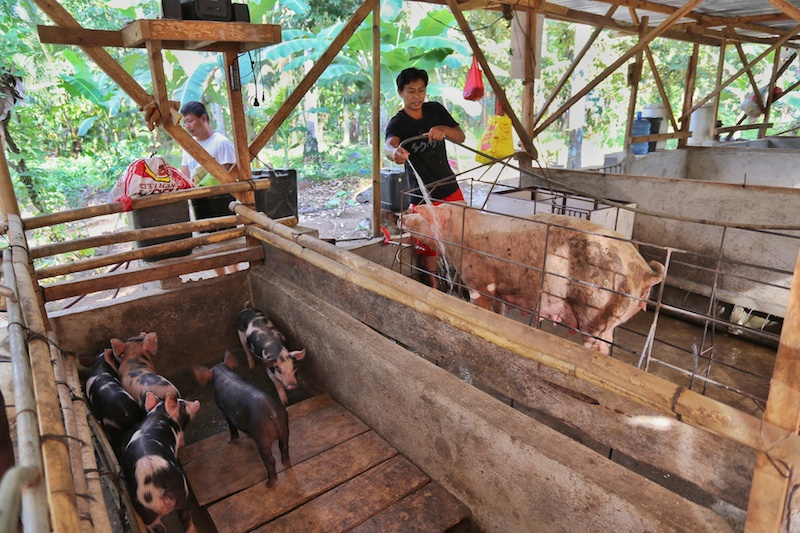 A pig grower in Barangay Lamanan in Calinan District, Davao City tends to his pigs on 7 Feb 2020, which will be collected for culling due to the African Swine Fever. MindaNews photo by MANMAN DEJETO
A pig grower in Barangay Lamanan in Calinan District, Davao City tends to his pigs on 7 Feb 2020, which will be collected for culling due to the African Swine Fever. MindaNews photo by MANMAN DEJETO
The transboundary animal disease can be spread by live or dead pigs, domestic or wild, and pork products, it said.
The BAI said the disease is “characterized by high fever, loss of appetite, hemorrhages in the skin and internal organs, and death which follows between two to 10 days on the average” and mortality can be as high as 100%.
Pinili said the disease can kill in “two to four days.”
There is no vaccine for ASF and no treatment for it as yet.
1-7-10 kilometer protocol
The first report of pig deaths, Pinili said, came on the second week of January when their livestock inspector reported to the office the death of three of five pigs who had fallen ill and were given medicines.
When the inspector returned to the area, she said, there were again deaths, hence they took blood samples.
The blood samples from Dominga were taken on January 31 and Lamanan on February 3.
Onate said they have instituted the 1-7-10 kilometer protocol and have asked the Philippine National Police (PNP) to help them set up the checkpoints.
Pinili said that as early as when samples were taken, they already asked the barangay captains to ensure no pig, pork and other pork products, raw or processed, can get out – or enter – these barangays.
As soon as the tests yielded positive on February 5, Pinili said she coordinated with the PNP to help them set up checkpoints at the exit areas of barangays Lacson, Dacudao and Sumimao.
She said they also briefed barangay captains on what the ASF is and what to do when the tests yield positive.
She said pigs in an area where a sample tested positive and those falling within the one-kilometer radius, will all be culled to prevent the spread of the killer disease, bury them in a designated area and proceed with decontamination and disinfection.
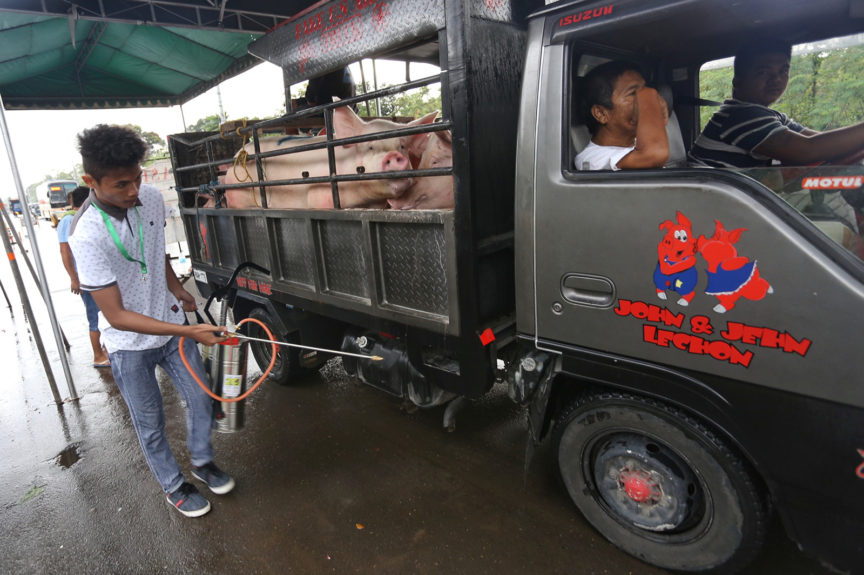 A truck carrying pigs is disinfected before passing through the Task Force Davao checkpoint in Toril, Davao City on 6 February 2020. The Department of Agriculture has confirmed the presence of African Swine Fever in two barangays of Davao City in a press conference afternoon of the same day.
A truck carrying pigs is disinfected before passing through the Task Force Davao checkpoint in Toril, Davao City on 6 February 2020. The Department of Agriculture has confirmed the presence of African Swine Fever in two barangays of Davao City in a press conference afternoon of the same day.
MindaNews photo by MANMAN DEJETO
Those within seven kilometers from ‘Ground Zero’ of the ASF will be under surveillance and monitoring where checkpoints will be set up to monitor “possible illegal transport.” Pigs in these areas will also be tested for ASF and movement will be controlled.
Beyond the 10-kilometer radius, backyard raisers are expected to immediately report any death and movement of live animals, products and by products will still be allowed to enter and leave provided it is “with proper documentation.
Onate said they have informed the provincial governments of Davao del Norte and Bukidnon to also secure their areas to prevent the entry of ASF. Some barangays in Davao City share boundaries with Davao del Norte and Bukidnon.
Pinili and Onate reiterated that swill feeding should be avoided as this could be a source of the ASF.
Pinili said barangays adjacent to Dominga and Lamanan such as Sumimao, Malabog, Pangyan, Dacudao and Lacson are being monitored, too.
Suspected cases of ASF were reported in Puroks 4 and 8 of Barangay Lacson on Friday. (Carolyn O. Arguillas / MindaNews
